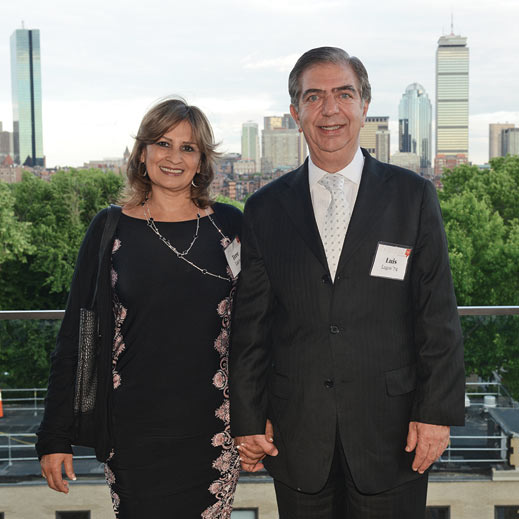Luis Lagos did well in his first job after graduation, joining a bank in his native Mexico and rising to CEO. But he left that post in 1987 for something a little different: working in a friend’s drugstore, stocking shelves, running the cash register, and sweeping up.

“After six months of that, I understood enough to open my own drugstore,” he says. In 1988, Lagos opened the first drugstore of what is now Mexico’s Farmatodo chain, which he built to more than 150 stores before selling it in 2006.
In the same period, he led the creation of a national association of pharmacy owners, which developed an industry-standard inventory management system, and he also made successful entrepreneurial forays into vehicle leasing, construction, hospitality services, and many other sectors. “I’ve always had at least two jobs; I have boxes and boxes of business cards,” he jokes.
Lagos sold his most recent venture, a light manufacturing facility near the U.S. border, in 2013. Now, though retired, he provides financial consulting to a company that specializes in process management systems.
He credits much of his adaptability to MIT, where he learned that “you don’t have to be afraid, because you can learn about whatever is in front of you. It gives you confidence—that no matter what, you can study something and make it work. It’s a fearless approach to life.”
Yet reaching the Institute was not straightforward for Lagos, who was 17 when he lost his father to cancer. “He told me he wanted me to take care of his mother and my mother, and to go to MIT,” he recalls.
After applying unsuccessfully several times, Lagos spent a year at Northeastern University and then took MIT summer classes in calculus and economics. With favorable reviews from his professors, he was admitted to the class of 1974, joining his brother Adolfo ’71 at the Institute.
Lagos has a daughter and two sons; he and his wife, Tere, live near Mexico City. His primary leisure pursuit for more than 50 years has been competing in rally races, driving cars (including a beloved VW Golf) in events ranging in length from one to three days. “It’s magnificent, a lot of fun,” says Lagos. “I’ve won many races, lost many races, and crashed a lot of cars.”
Keep Reading
Most Popular
Large language models can do jaw-dropping things. But nobody knows exactly why.
And that's a problem. Figuring it out is one of the biggest scientific puzzles of our time and a crucial step towards controlling more powerful future models.
The problem with plug-in hybrids? Their drivers.
Plug-in hybrids are often sold as a transition to EVs, but new data from Europe shows we’re still underestimating the emissions they produce.
How scientists traced a mysterious covid case back to six toilets
When wastewater surveillance turns into a hunt for a single infected individual, the ethics get tricky.
Google DeepMind’s new generative model makes Super Mario–like games from scratch
Genie learns how to control games by watching hours and hours of video. It could help train next-gen robots too.
Stay connected
Get the latest updates from
MIT Technology Review
Discover special offers, top stories, upcoming events, and more.